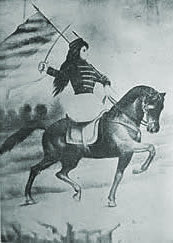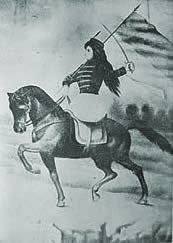
|
Women and Independence in Latin America An exploration of women's involvement in the Latin American Wars of Independence |

|

|
Women and Independence in Latin America An exploration of women's involvement in the Latin American Wars of Independence |

|
Gender:Female
Ethnic origen: Unknown
Events:
| 1835 | - | Caracas | - | Unknown | - | She was sentenced to death for murdering a slave. |
| 1836 | - | Caracas | - | Unknown | - | She appealed against her sentence as she was pregnant and was sent into exile. |
| 1836 | - | Margarita | - | Unknown | - | She was sent into exile on Margarita Island for 8 years. |
Connections:
Women convictsTexts:
1835 - Letter written to the rebel administration in Caracas. Translated by Arlene Díaz. Díaz.....
Biography:
In 1836 she was sentenced to death for murdering a female slave, María de la Cruz, in Caracas. She was pregnant. The case sparked a political debate regarding the death penalty in general and Ochoa's case in particular. It was not certain that she had committed the crime, there were no witnesses and she may have acted in self defence. Díaz argues that the case shows that in the early republic, women's crimes were judged equally with those of men. She was described as a Madre de familia and she claimed she was a woman "whose example in matrimony is very useful to society". She was a woman and valuable to the family therefore her life should be spared. The tone of the debate surrounding this case was that to execute her would bring sympathy for her and reveal the government to be violent. In July 1835 the government was overthrown and she wrote to the rebel government protesting her innocence and asking for clemency. She said that public opinion was in her favour and there would be an uproar if she were executed and stated that she had given birth while in prison and was breast-feeding her child. The rebel government fell, and her letter was ignored. There was an appeal and her execution was fixed for 17 May 1836. A week before she was found to be pregnant and another outcry took place. The owner of the murdered slave wrote asking for clemency and on 24 May 1836 twenty-seven mothers wrote a letter to ask for the sentence not to carried out on the weak sex". Carmelite and Dominican nuns also wrote to the Vice-president to prevent the execution, claiming motherhood to be a "social function in religious interpretation" and forgiveness is more important than punishment. She was sent into exile to Margarita Island for eight years in 1836. (Díaz, 108, 120-131)
The details of the case are as follows: María de la Cruz sold clothes in Caracas; Ochoa owed her money. On 28 October Cruz went to Ochoa's home to collect the debt and Ochoa ordered her to be tied up, she hit her and then smothered her with a cloth. Cruz's body was then placed in a sewer where it was discovered five days later. Ochoa sold the clothing that Cruz had brought with her. On 3 May 1836 Ochoa was sentenced to death, on 25 May, just before her execution, she pronounced she was pregnant. (Díaz, 147-149)
References:
Díaz, Arlene J. (2004) Female Citizens, Patriarchs and the Law in Venezuela, 1796-1904